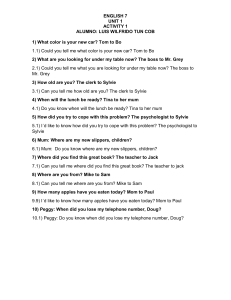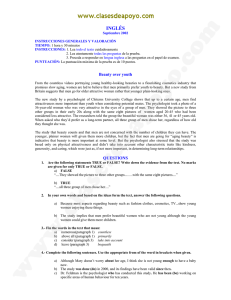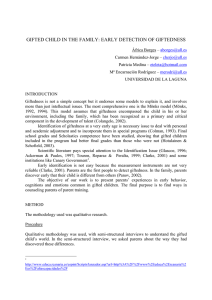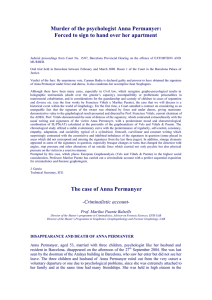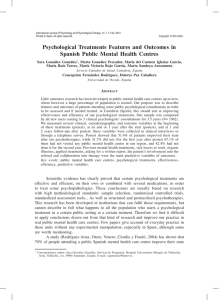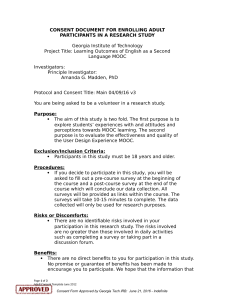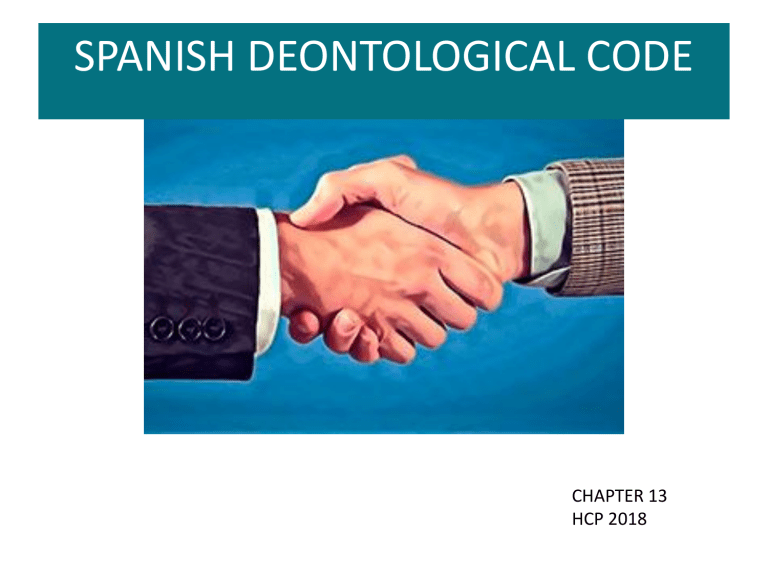
SPANISH DEONTOLOGICAL CODE CHAPTER 13 HCP 2018 SPANISH DEONTOLOGICAL CODE It has a total of 61 articles describing 4 main aspects of the profession: 1. GENERAL PRINCIPLES 2. ABOUT PROFESSIONNAL COMPETENCE AND THE RELATION WITH OTHER PROFESSIONALS 3. ABOUT INTERVENTION 4. ABOUT RESEACH AND TEACHING 5. ABOUT USE AND OBTENTION OF INFORMATION 6. ABOUT ADVERTISING 7. ABOUT PROFESSIONAL FEES AND PAYMENT 8. LEGAL GUARANTEES GENERAL PRINCIPLES Some very important articles here: 6º: Psychology as profession is ruled by deontological principles: respect to the client, human rights protection, sense of responsibility, honesty, sincerity, caution when using techniques and tools, professional competence and scientific grounds for their professional interventions. 7º: The psychologist will never produce or collaborate with any practice that compromise the client freedom, physical and/or psychological integrity. 10º: No discrimination in terms of born, age, race, sex, creed, ideology, nationality, social status or any other differential aspect will happen. ABOUT PROFESSIONNAL COMPETENCE AND THE RELATION WITH OTHER PROFESSIONALS Some very important articles here: 17º: professional authority is based upon the qualification and training of the psychologist. They must be professionally trained and specialized in the use of methods, instruments, techniques and proceedings needed for their job. Is part of the psychologist work to be updated on this training, being aware of their limitations. 18º: a psychologist will not use methods or proceedings that are not scientifically well established, but if they do, they must inform their clients beforehand. 23º: the professional exercise of psychology is based upon the right and duty of mutual respect with other professions, specially with those close to psychology. ABOUT INTERVENTION Some very important articles here: 26º: The psychologist must finish their intervention and not to extend it with deceptive procedures once the objectives of it are met or when, after a reasonable time, they are not possible (if this is the case, they must transfer this client to other professional that might help with it). 27º: For no reason a client´s freedom to withdraw intervention or change psychologist will be restricted. The psychologist will always facilitate the client´s information for a right decision about it. The psychologist will never intervene simultaneously with other psychologist working with the same client. 32º: The psychologist must not create false expectancies to a client that will not be able to professionally met. ABOUT RESEACH AND TEACHING Some very important articles here: 34º: The psychologist will always refuse to inflict any permanent, unnecessary or irreversible damage to the client when doing research. Any investigation participant must previously and explicitly authorize their participation (both adults and parents or legal tutors of a minor or disable person). 35º: If a research design includes any harm or discomfort to the client, the psychologist must ensure that the client has all the information about the process and all the freedom to decide about their participation, as well as the right to withdraw anytime. 37º: Any research (experimental or observational) must ensure to respect people´s dignity, their believes and right to intimacy. The psychologist must treat with all delicacy sensible aspects of the behaviour and carefully consider special risk population such as elderly, brain injured, convicted and any social risk population. 38º: Animal experimentation will reduce to minimum or avoid any unnecessary harm or suffering. ABOUT USE AND OBTENTION OF INFORMATION (I) Some very important articles here: 39º: The psychologist will ask their clients only the information they need to professionally intervene with them. They will scrupulously respect their privacy, using only the information they need with their client´s consent. 40º: All the information gathered by mean of verbal expression, standardized assessment or professional observations must be treated under the duty of professional secret. This secret can only be broken after the client´s specific consent. The psychologist must take care that this professional secret also apply to other professionals. 41º: The results of assessment of intervention can be shared with third persons only after specific consent of the client. ABOUT USE AND OBTENTION OF INFORMATION (II) 42º: When a third person ask for information about your client (judges, teaching professionals, parents, employers, etc), the client or their legal tutors have the right to be informed about the nature of the evaluation and who is requesting it. The client has the right to know the result of the psychological report, even when the request was made by a third person, except when this information might cause any important harm to the client or the psychologist. 45º: The exposure of any information from your clients in teaching or scientific environments must be done ensuring the privacy and confidentiality of the client. If that is not possible, a written consent is required to do it. 47º: Explicit or implicit presence of third persons in the interventional environment (e.g. undergrads or trainees) must be agreed beforehand by the client. 49º: Disappearance or death of the client is not a cause of professional secret to be broken. ABOUT ADVERTISING Some very important articles here: 51º: Is a serious violation of the deontological code to claim and/or advertise any professionally unmet or ambiguous degree that might lead clients to error. 53º: If the psychologist is using a nickname for their professional activity, they must inform of that to their Professional Chartered Association for the registry of it. ABOUT PROFESSIONAL FEES AND PAYMENT Some very important articles here: 55º: The psychologist must inform the client about their professional fees before starting any intervention. 56º: The psychologist must never receive any payment or earn any money by means of tranfering clients to another professionals. LEGAL GUARANTEES Some very important articles here: 57º: Deontological Commission created by the Consejo General de la Psicología (CGP) must ensure this code is followed by any professional of psychology. They must disseminate and help to interpret this code within psychologist and any social institution, and they will ensure university undergraduate psychologist study them. 59º: The CGP will grantee the defence of any chartered psychologist that are in risk or suffer any violation of the code, specially concerning to professional secret and professional independence of the psychologist.

